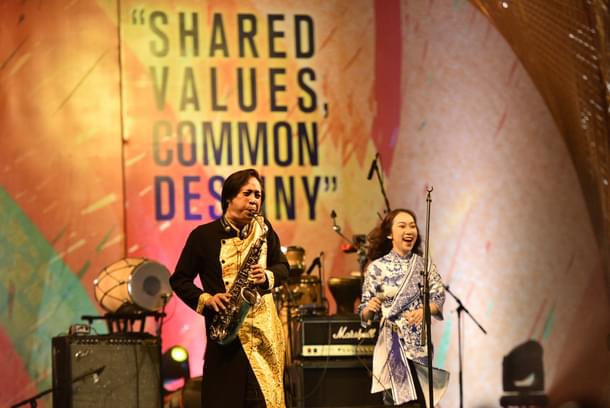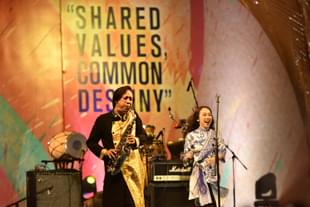Magazine
Shared Values, Common Destiny: The Call Of The ASEAN
Harsh V Pant
Dec 07, 2017, 05:37 PM | Updated Dec 06, 2017, 11:17 AM IST
Save & read from anywhere!
Bookmark stories for easy access on any device or the Swarajya app.


Inviting leaders of 10 South East Asian countries to attend the 2018 Republic Day celebrations as well as participate in a commemorative summit marking the 25th anniversary of India’s ties with the bloc, Prime Minister Narendra Modi said 1.25 billion people of India are keen to welcome the Association of Southeast Asian Nations (ASEAN) leaders as the chief guests at India’s 69th Republic Day celebrations. In his address at the ASEAN-India Summit in Manila, Modi said he was looking forward to a “befitting culmination of the commemorative year and receiving you” at the India-ASEAN Special Commemorative Summit on 25 January, 2018 in New Delhi. India and ASEAN are observing 25 years of their Dialogue Partnership, 15 years of summit-level interaction and five years of strategic partnership this year and it is being celebrated with a wide range of activities, both in India and through missions in ASEAN member states, culminating in a commemorative summit on the theme “Shared Values, Common Destiny”.
Addressing the 15th ASEAN-India Summit, Modi said India’s relationship with ASEAN remains a key pillar of its foreign policy. Referring to India’s Act East Policy, he underlined that “its centrality in the regional security architecture of the Indo-Pacific region is evident”. Modi made it clear that India’s Act East Policy puts ASEAN at the centre of our engagement and India has enjoyed “exceptionally good political and people-to-people relations with each and every country in the ASEAN region”.
This understanding is leading New Delhi to push for viewing India’s Northeast as key to linking up with Southeast Asia. Inaugurating the North East Development Summit in November, President Ram Nath Kovind said, “if you consider the hundreds and thousands of years of civilisation, far from being a frontier, the Northeast has been at the heart of the Indian imagination. And if you take South Asia and Southeast Asia as a continuum — as it has been perceived for most of history — then the Northeast is right in the middle of it.... Its geographical location makes it the obvious gateway to India, linking the vast economies of the Indian subcontinent and of today’s ASEAN countries.” India is viewing its role in the wider Indo-Pacific region through a new prism, which is now key to India’s ASEAN outreach.
In the post-Cold War era, Indian engagement of East and Southeast Asia assumed significant proportions and today, remains a top foreign policy priority for the Indian leadership. India is now a full dialogue partner of the ASEAN, a member of the ASEAN Regional Forum, the regional security forum, since 1996, and a founder member of the East Asian Summit launched in December 2005. India is also a summit partner of ASEAN on par with China, Japan, and South Korea since 2002. Over the years, India has also engaged not only in extensive economic and trade linkages with various countries in the region, but also in security cooperation. Prime Minister Modi has made it clear that his government’s foreign policy priority will continue to be East and Southeast Asia, which are poised for sustained growth in the 21st century.
The ASEAN members and India together comprise one of the world’s largest economic regions with a total population of about 1.8 billion. ASEAN is currently India’s fourth largest trading partner, accounting for 10.2 per cent of India’s total trade. India is ASEAN’s seventh largest trading partner.
India’s service-oriented economy perfectly complements the manufacturing-based economies of ASEAN countries. India and Southeast Asian countries share longstanding civilisational ties, the impact of which is evident in the cross-fertilisation of cultures and traditions. These commonalities are an integral part of the economic and security pillars of the ASEAN community. The cultural linkages have evolved over the centuries through the exchange of people, cultural values, education, trade and commerce.
There is, however, considerable scope for a more broad-based partnership. Formidable security challenges remain, and the two sides must think strategically to increase cooperation for a favourable balance of power that would ensure regional stability. India has been supporting freedom of navigation and access to resources in the South China Sea in accordance with principles of international law, including the 1982 United Nations Convention on the Law of the Sea. For its part, the ASEAN has been pushing for a legally binding code of conduct for all stakeholders in the South China Sea. This has not found favour with Beijing, which continues to assert, not surprisingly, that it would resolve the dispute with respective countries only bilaterally.
The changing regional balance of power was at the heart of the meeting of officials from India, the United States (US), Japan, and Australia under the proposed Quadrilateral Initiative of the four countries held on the sidelines of the East Asia Summit.
According to the Ministry of External Affairs, “the discussions focused on cooperation based on their converging vision and values for promotion of peace, stability and prosperity in an increasingly inter-connected region that they share with each other and with other partners”. The central argument was simple, that “a free, open, prosperous and inclusive Indo-Pacific region serves the long-term interests of all countries in the region and of the world at large.”
India’s efforts to make itself relevant to the region come at a time of great turmoil in the Asian strategic landscape. Events in recent years have underlined China’s aggressive stance against rivals and US allies in Asia; these tensions are only expected to heighten in the coming years. With its political and economic rise, Beijing has started trying to dictate to its neighbours the boundaries of acceptable behaviour. As a result, regional states are reassessing their strategies. India’s role becomes critical in an evolving balance of power.
As Singapore’s elder statesman Lee Kuan Yew had argued some years ago, India must be “part of the Southeast Asia balance of forces” and “a counterweight (to China) in the Indian Ocean”. India’s Act East Policy is part of this larger dynamic.
As New Delhi has reached out to its partners in South and Southeast Asia, the regional states have also shown an unprecedented reciprocal interest in Indian foreign policy priorities.
Common concerns and aspirations bind the ASEAN countries and India, at a time when Asia is in the throes of a disruptive phase that could well determine the future balance of power in the region. The two remain indispensable to the creation of new “rules of the game” in Asia. India needs to do a more convincing job as a beneficial strategic partner of ASEAN by boosting its domestic economic reforms agenda, enhancing connectivity within the region, and increasing its presence in regional institutions. The ASEAN nations should be clearer and more specific in their expectations from New Delhi and nudge India for a deeper, more broad-based engagement. There is much at stake for both sides.
Harsh V Pant is a Distinguished Fellow at Observer Research Foundation, New Delhi, and Professor of International Relations at King’s College, London.
Harsh V Pant is a Distinguished Fellow at Observer Research Foundation and Professor of International Relations, King’s College London.





